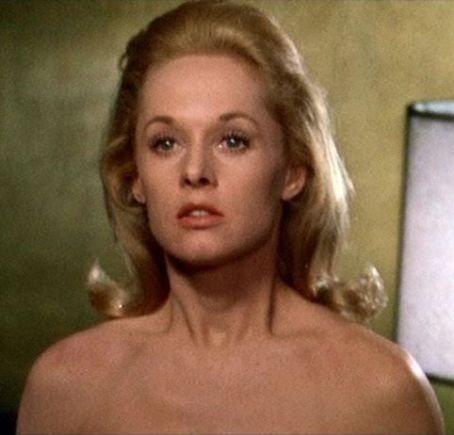Alfred Hitchcock was one of the greatest film directors of all time. But, like many great artists, Hitch had some issues. One issue that has gotten a lot of press over the years (including a controversial 2008 book) was the icon's infatuation with his blond leading ladies.
Indeed, a look back at Hitchcock's most famous films reveals that he almost exclusively cast blondes as female leads. Grace Kelly, Kim Novak, Doris Day, Eva Marie Saint, Tippi Hedren, and Janet Leigh, to name a few.

TIPPI HEDREN
Hedren, who starred in Hitchcock's "Marnie" and "The Birds," recently spoke at an HBO panel session at the Television Critics Association.
When asked to discuss Hitchcock's feelings for her, Hedren, who is Melanie Griffith's mom, didn't hold back.
"I don't know what to call it," the still-stunning 82-year-old said. "It was something I'd never experienced before. It wasn't love. When you love someone, you treat them well. We are dealing with a mind here that is incomprehensible. And I certainly am not capable of discerning what was going through his mind or why. I certainly gave no indication that I was ever interested in a relationship with him."
Hedren was at the panel discussing the upcoming HBO movie "The Girl," in which Sienna Miller will star as Hedren and Toby Jones will play Hitchcock. Hedren remarked, "He was an extremely sad character. You're dealing with a brain here that was unusual, genius, and evil and deviant, almost to the point of dangerous because of the effect he could have on people who were totally unsuspecting."
"The Girl" is sure to draw strong reactions when it airs October 20. In one scene, Hitchcock aggressively attempts to kiss Hedren in the back of a car while filming "The Birds." Later there is a scene in which Hitchcock insists that Hedren make herself available to him sexually, something Hedren refused to do in real life. Hedren is then subjected to grueling work on the set of "The Birds." In one scene, Hitchcock throws stuffed birds at Hedren without warning. In real life, he apparently required Hedren to work in an attic with live birds for five days. Hedren says she suffered cuts to her face as a result.
The harassment wasn't something Hedren could escape due to her contract (harassment laws were quite different in the '50s). "If this had happened today I would be a very rich woman," she said. Hedren contends that Hitchcock effectively blackballed her from the industry after "Marnie." Hitchcock "ruined my career but he didn't ruin my life," she said. Hedren says she "lived through it beautifully."
Hedren isn't the only Hitchcock actress to have had issues with the famed director. Kim Novak, who played duel roles in "Vertigo," has said that she never knew what Hitchcock was thinking. In a 1996 interview with Roger Ebert, Novak remarked, "I don't know if he ever liked me. I never sat down with him for dinner or tea or anything, except one cast dinner, and I was late to that. It wasn't my fault, but I think he thought I had delayed to make a star entrance, and he held that against me."
Critics have theorized that "Vertigo" is Hitchcock's most autobiographical film, a story about a man desperate to mold a woman into what he wants. Novak told Ebert, "I don't know how autobiographical the film was -- or even if it was," she said. "I know that Hitchcock gave me a lot of freedom in creating the character, but he was very exact in telling me exactly what to do."
Despite the two having a challenging work relationship, Novak says she wasn't subjected to unwanted advances. "Maybe I just wasn't his type. He was a really fine gentleman. You always knew there was a lot going on in that head of his, behind that smile or smirk or whatever you call it. It was a perpetual sort of look that you didn't know how to take. He could be furious and he'd have that same smile."
Though people didn't much care for it when it first hit theaters in 1958, "Vertigo" was recently named as the best movie of all time by the prestigious Sight & Sound. That's quite a switch from Sight & Sound's original review in 1958, when the critic wrote that "Vertigo" is "reminiscent of things Hitchcock has done before, and generally done with more verve. One is agreeably used to Hitchcock repeating his effects, but this time he is repeating himself in slow motion."

KIM NOVAK

GRACE KELLY

